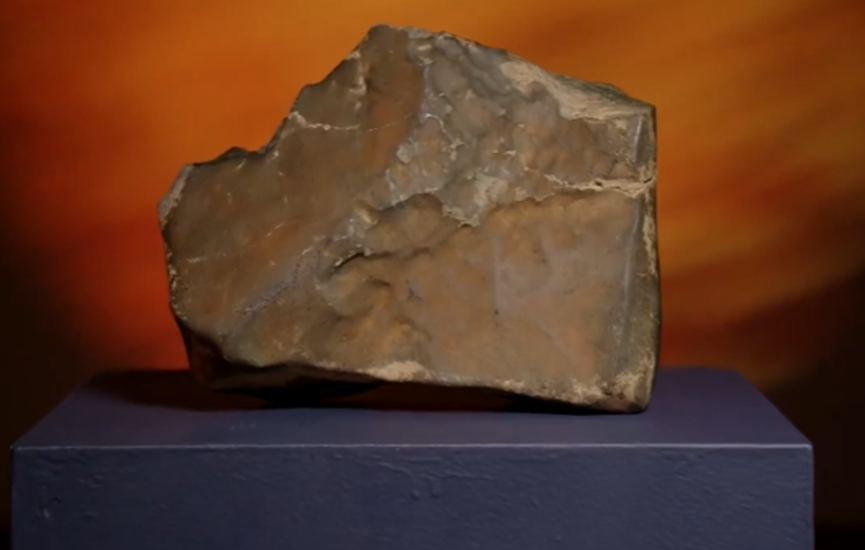"Brazen! It is brazen!" Professor Paul Sereno exclaims from Chicago, expressing his anger over the auction of a rare meteorite from Mars discovered two years ago in Niger. The paleontologist, who has close ties to the country, believes the meteorite should be returned to Niger.
The large Martian rock, the biggest ever found on Earth, was sold for $4.3 million at Sotheby’s last month, with both the buyer and seller remaining anonymous. It is still unclear whether any of the proceeds went to Niger.
Meteorites, long revered by humans as objects of wonder or scientific curiosity, have also become valuable commodities. The trade in meteorites is often likened to the art market, with rarity and aesthetics influencing their price.
Initially, the extraordinary Martian find sparked awe, as less than 400 of the 50,000 meteorites discovered are known to be from Mars. Photos of the 24.7kg (54lb) rock glowing silver and red at Sotheby’s enhanced the sense of its rarity.
However, as the sale unfolded, questions arose about how the meteorite ended up in the auction. The government of Niger has expressed doubts about the legality of its export, raising concerns about potential illicit international trafficking.
Sotheby’s strongly denies any wrongdoing, asserting that all correct procedures were followed in the sale of the Mars meteorite NWA 16788. However, Niger has launched an investigation into the discovery and sale of the meteorite, which was found in the Sahara Desert in November 2023.
An Italian academic article revealed that the meteorite was discovered in Niger’s Agadez region by an unnamed meteorite hunter. The Sahara, with its favorable climate and minimal human interference, is a prime location for meteorite finds. According to the article, NWA 16788 was sold to an international dealer and later transferred to a private gallery in Arezzo, Italy.
A team from the University of Florence, led by Professor Giovanni Pratesi, examined the meteorite and displayed it in Italy before it made its way to Sotheby’s in New York. Sotheby’s maintains that all legal and international procedures were followed during the meteorite's transport and sale, with appropriate documentation at each stage.
Despite this, Professor Paul Sereno, who founded NigerHeritage, is convinced that Nigerien laws were violated in the process.
Professor Paul Sereno, an academic at the University of Chicago known for uncovering dinosaur bones in the Sahara, advocates for the return of Niger’s cultural and natural heritage, including meteorites. He campaigns to preserve the country’s vast collection of artefacts, which will be housed in a planned museum on an island in the River Niger in Niamey, the capital.
“International law prohibits the removal of important cultural, natural, or extraterrestrial items from a country,” Sereno argues, stressing the shift away from colonial-era practices. While global agreements, including those under UNESCO, regulate the trade of such items, there is some ambiguity about whether meteorites are included, according to international law expert Max Gounelle’s 2019 study.
Niger introduced a law in 1997 to protect its heritage, listing "mineralogical specimens" but not specifically meteorites. In its statement regarding the Sotheby’s sale, Niger admitted it lacks specific legislation on meteorites. The country has raised concerns about how such a large and valuable item was exported without authorities noticing.
Morocco has faced a similar challenge with over 1,000 meteorites found within its borders, including parts of the Sahara. The country experienced a "Saharan gold rush" over two decades ago, driven by lax regulations and a more stable political environment. In her book The Meteorites, author Helen Gordon described Morocco as one of the world’s largest exporters of space rocks.
Professor Hasnaa Chennaoui Aoudjehane has spent 25 years working to retain some of these extraterrestrial materials for Morocco. While not opposed to the meteorite trade, she has played a key role in introducing regulations to manage the industry. However, she admits that these efforts have not entirely stopped the flow of meteorites out of the country.
In 2011, Prof Chennaoui collected pieces from a meteorite fall in the desert that turned out to be from Mars, later named the Tissint meteorite. While it weighed 7kg, only 30g remains in Morocco, with the rest now in museums worldwide, including a large piece on display at the Natural History Museum in London.
Reflecting on Niger's Martian meteorite, she said she was not surprised by the sale, having dealt with similar issues for 25 years. Prof Paul Sereno hopes that the Sotheby’s auction of the meteorite will prompt Niger to take action and potentially bring it to a public museum, where the country can openly contest its ownership.
